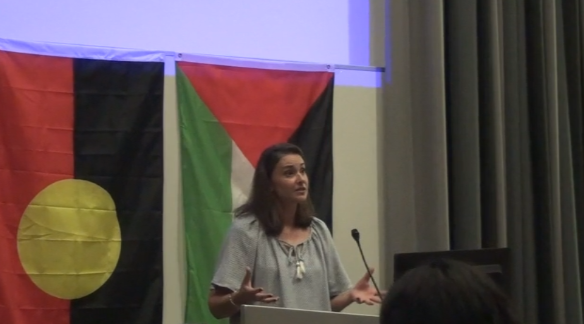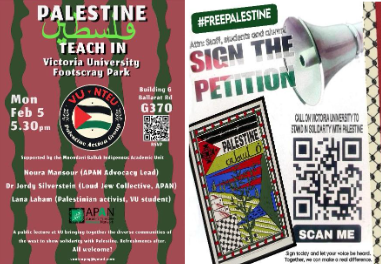Posted on Friday, 16 February
The Victoria University National Tertiary Education Union Palestine Action Group (VU NTEU PAG) has continued to campaign over recent months.
On Monday evening, February 5th, the VU NTEU PAG held a Community Teach-In at the Footscray Park campus. Speakers included Noura Mansour (Australia Palestine Advocacy Network), Dr Jordy Silverstein (Loud Jew Collective), Lana Laham (VU student and activist), Dr Lew Zipin (VU Honorary Fellow) and Dr Paola Balla (VU staff member from Moondani Balluk, the Indigenous Academic Unit).
Many speakers drew connections between processes of colonization and other forms of structural violence enacted by nation-states across the world and the need for people to show solidarity through mass participation in anti-racist and anti-colonial struggles.

“The world made a political decision back in 1948 – including the United Nations, including the Red Cross, including journalists around the world and media – they made a political decision to look the other way and to accept the creation of the Israeli state that was built on the ruins and ashes of my family and my people.”
Noura Mansour, Australia Palestine Advocacy Network
Dr Brandy Cochrane, President of the VU Branch of the NTEU, chaired the event which continued the Palestine solidarity demonstrated by the VU NTEU leadership since October 7th. Members of our campaign group have spoken with colleagues who have joined the union for the first time because of this solidarity with Palestine which reiterates that standing against genocide is not counterposed to building union power.
Many guests at the Teach-In proudly wore their keffiyehs and smiled as they approached the lecture theater entrances. Upwards of ninety people attended the event and this included a mix of university staff, students, and broader community members. Campaign volunteers had worked hard behind-the-scenes building this great turnout through postering around campus, social media promotion, inviting people we knew, and leafleting at Footscray train station and the Sunday rallies.

VU NTEU PAG activists utilised a range of skills to produce campaign materials such as a poster (left) for the Teach-In and leaflets (right) for the petition.
This organizing work is often just as important as the event itself because it helps members (some of whom have not been involved in organized activism and leading campaigns until now) develop skills, knowledge, and relationships for political organizing; and members can take on new roles and responsibilities, thereby boosting the organizational capacity of the campaign group to politically intervene.
The VU NTEU PAG wanted to ensure that any staff who were keen to organize for Palestine solidarity at VU had the opportunity to get involved in the campaign group. In January we launched a petition addressed to VU management (now signed by over one hundred VU students, staff, and alumni) and the petition working group has sent regular emails to encourage staff signatories to join the campaign group and help organize the Teach-In.
At the Teach-In we stationed volunteers at entrances with leaflets and we set up a stall with a range of resources prepared in the lead up by members: food, leaflets, sign-up sheets, and even poetry. We met a few VU staff members who later in the week attended our weekly organizing meetings (which we promoted at the Teach-In) and joined the campaign group.
Moondani Balluk supported the event and hosted guests for refreshments after the Teach-In where the discussions continued. Our activists had already gained confidence from the experience of organizing a successful event and began drawing out lessons for the next steps in the campaign.
There is a feeling of excitement around the potential for a broad coalition of students, staff and community members campaigning for Palestine solidarity at VU. Students return for their first semester in February which provides opportunities for student groups to campaign around Palestine solidarity and for more staff to actively participate in the campaign. The political leadership shown by rank-and-file unionists in initiating this campaign reflects the potential for workers to intervene politically, organize collectively, and effect change in their workplaces and communities.